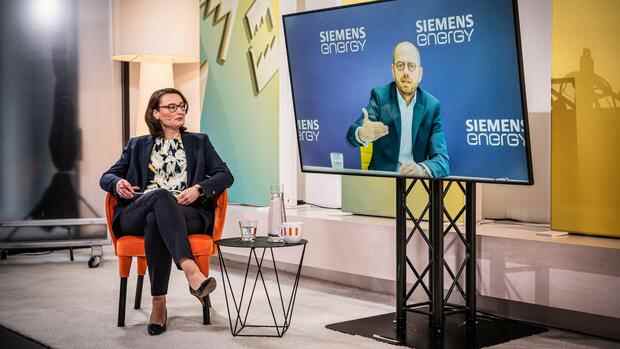Düsseldorf, Zurich Markus Steilemann rarely allows himself to be dissuaded from his innate optimism. As CEO of the plastics manufacturer Covestro, he knows about the huge challenges of a green restructuring of the industry. But he sees a good chance that the change of government in Berlin will bring about a breakthrough: “The traffic light is a new broom, and it is well known that they sweep well. That gives me great hope. “
Steilemann opened this year’s industrial summit of the Handelsblatt on Thursday with an appeal: “We need a decade of new beginnings and we have to leave the flour dust of the past years behind us,” he said. The manager advocates a new pact between business, politics and society. “An optimistic and constructive cooperation is required, which is based more on facts and less than myths.”
It can currently be observed in large parts of the German economy: entrepreneurs and managers support the goals and announcements that are listed in the coalition agreement of the new federal government. But with all the applause: The wish list for politicians is long – and doubts that the projects will not progress as planned are widespread.
“It is always wise to bring the issues of economy and climate together in one ministry,” said Christian Bruch, CEO of Siemens Energy, at the industry summit. A coherent concept with the right framework conditions for the green transformation must now emerge from this.
Top jobs of the day
Find the best jobs now and
be notified by email.
The fundamental needs of companies are clear: They see climate protection as an opportunity and are tackling the issue – from the point of view of some experts, they are now more committed than politicians. But for the necessary investments they need planning security that extends well beyond the next few years.
“Companies must be relieved of operating costs”
“Sufficient green electricity is nowhere in sight,” complains Covestro boss Steilemann. But you need pragmatic and reliable timetables. “All traffic lights must now be set to the green wave.”
Companies want less bureaucracy and faster approval procedures for new industrial plants and renewable energies. Especially in industries in which new plants and systems are planned for decades to come, the following applies: What is not decided or tackled today will not exist in 2030.
For Frank Peter, industry expert and deputy head of the Agora Energiewende think tank, the coalition agreement between the traffic light parties provides important incentives for the green turnaround. However, companies should not rely solely on tougher guidelines from politics. “Industry has to make its contribution,” says Peter.
But the pressure for the green transformation hits the entire economy in a difficult phase: delivery bottlenecks are slowing production, exploding prices for primary products are affecting profits, and skilled workers are difficult to find. This dangerous mix makes many companies cautious, especially in German medium-sized companies, when it comes to planning larger investments. For Joachim Lang, General Manager of the Federation of German Industries (BDI), this is an alarm signal. “In order to be able to cope with the investments, companies have to be relieved of the operating costs,” he demands.
The industry hopes that the backlog in production caused by the lack of preliminary products will be resolved in the coming spring. For the green transformation to be successful, it not only needs cheap green electricity, but also a secure supply of raw materials.
High raw material prices are slowing down the energy transition
But this is a challenge, especially in the current transition phase: German companies paid more for electricity in the first half of 2021 than they have for ten years. The European gas price recently exceeded the 100 euros per megawatt hour mark again.
The International Energy Agency recently even warned that high raw material prices could slow down the energy transition. The sharp rise in the price of copper, steel and rare earths, for example, makes wind turbines more expensive. A high silicon price not only makes chips more expensive, but also solar cells. And for the first time in years, the falling price trend for e-car batteries has also stopped since metals such as lithium have become significantly more expensive.
In the short term, there is hardly any improvement in sight, at least not in the lithium market, says Dirk Harbecke, Chairman of the lithium start-up Rock Tech. The announcements by the carmakers of how much they are relying on e-mobility have reached a new level in the past twelve months. But this is difficult to reconcile with the range of highly concentrated lithium chemicals. “We will not be able to remedy the bottlenecks that will exist until 2025 so easily,” says Harbecke.
The topic of the supply chain will occupy the entire economy for the whole of next year, expects Siemens Energy boss Bruch. Corona has shown how interwoven and vulnerable the supply chains are. “We shouldn’t allow ourselves to be dissuaded from the energy transition because of this,” he said.
But it is also clear: Germany will always have to obtain many raw materials and intermediate products that are necessary for the green transformation from abroad. For many companies, global supply chain management remains permanently challenging, since the question of secure and timely supply always arises in every project.
More: Robert Habeck plans the socio-ecological market economy
